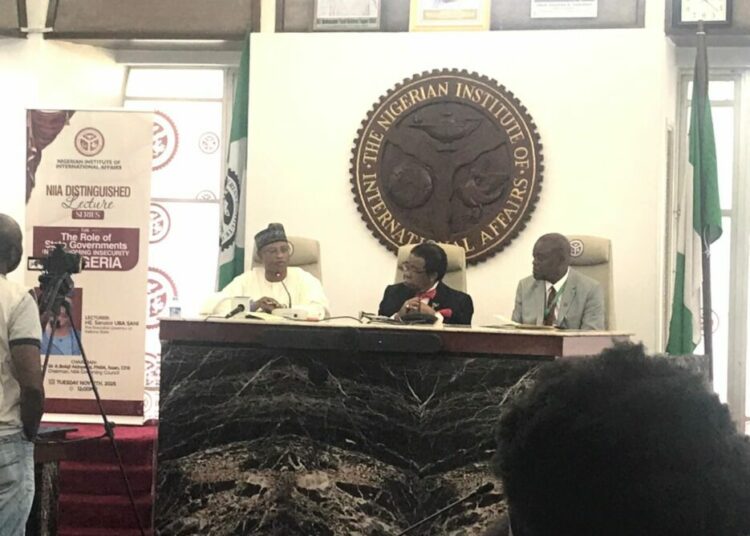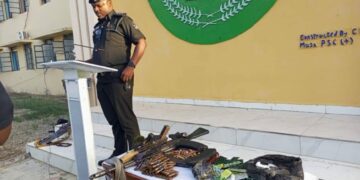Kaduna State governor, Senator Uba Sani, has strongly advocated for a comprehensive and multifaceted approach to tackling Nigeria’s worsening insecurity.
Speaking at the Distinguished Lecture Series of the Nigeria Institute of International Affairs (NIIA), Victoria Island, Lagos, under the theme “The Role of State Governments in Overcoming Insecurity in Nigeria,” Governor Sani emphasised that relying solely on military responses was insufficient to address the complex threats facing the nation.
Building on this, Governor Sani pointed out that the roots of insecurity extend beyond law enforcement, reflecting deeper governance failures, social exclusion, and economic marginalisation. He remarked that the country’s security challenges demanded a shift in focus towards inclusive governance and grassroots engagement.
“The most fundamental role of government has always been to protect citizens from violence, ensuring their safety first and foremost, “Without peace, development and progress are impossible,” he said.
The governor highlighted Kaduna State’s efforts in crafting a local approach to peacebuilding, which he described as vital for sustainable security. He discussed how Kaduna State faced significant challenges in 2023, with banditry, kidnappings, communal conflicts, and terrorist activities destabilising communities, causing villagers to flee and markets to shut down. Rather than relying exclusively on militarised measures, he said the State adopted an inclusive strategy centred on dialogue, community involvement, and socio-economic development.
He explained that the Kaduna Peace Model, a strategic framework based on grassroots participation, has facilitated meaningful engagement with traditional rulers, religious leaders, Fulani herders, farmers, and youth groups. These forums have helped address grievances related to identity, resources, and political exclusion, laying the groundwork for reconciliation and lasting peace. “Peace cannot be imposed; it must be cultivated from within communities through sustained dialogue and mutual trust,” he stated.
Furthermore, Governor Sani shared how Kaduna State established Peace Councils at the senatorial district level, composed of respected elders and community mediators. These councils act as dispute resolvers before conflicts escalate, supplementing formal security agencies and fostering local cooperation.
He also cited the importance of community policing, through which local vigilante groups are empowered with training, equipment, and communication tools to work alongside security forces resulting in the restoration of safety in many areas, reopening schools, and revitalising economic activities previously disrupted by violence.
Governor Sani underscored the importance of addressing the underlying governance deficits and socioeconomic issues that fuel violence nationwide. “Where citizens feel marginalised or voiceless, grievances will inevitably turn violent,” he warned.
He called for state governments to expand their roles beyond enforcement, championing social justice, inclusion, and economic opportunities as essential components of lasting peace.
The Kaduna experience, he argued, offers valuable lessons in resilience, demonstrating that security, development, and good governance are interconnected.
He added, “Traditional institutions and local actors are vital in peacebuilding and sustainable growth” While noting that engaging trusted community leaders could bridge the gap between authorities and the people.
Finally, Governor Sani urged Nigeria’s leaders to adopt this holistic, people-centred approach. Since May 2023, Kaduna has demonstrated that with courage, vision, and true partnership, insecurity can be turned around.
“Our future as a nation depends on the willingness of all levels of government to work together, this is how we will restore hope and stability across Nigeria,” he concluded.





